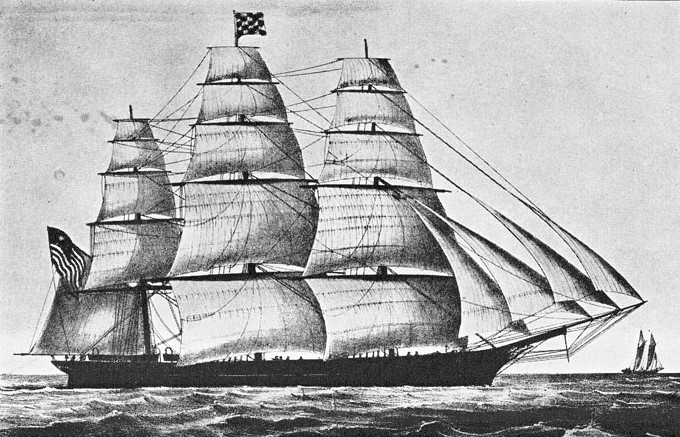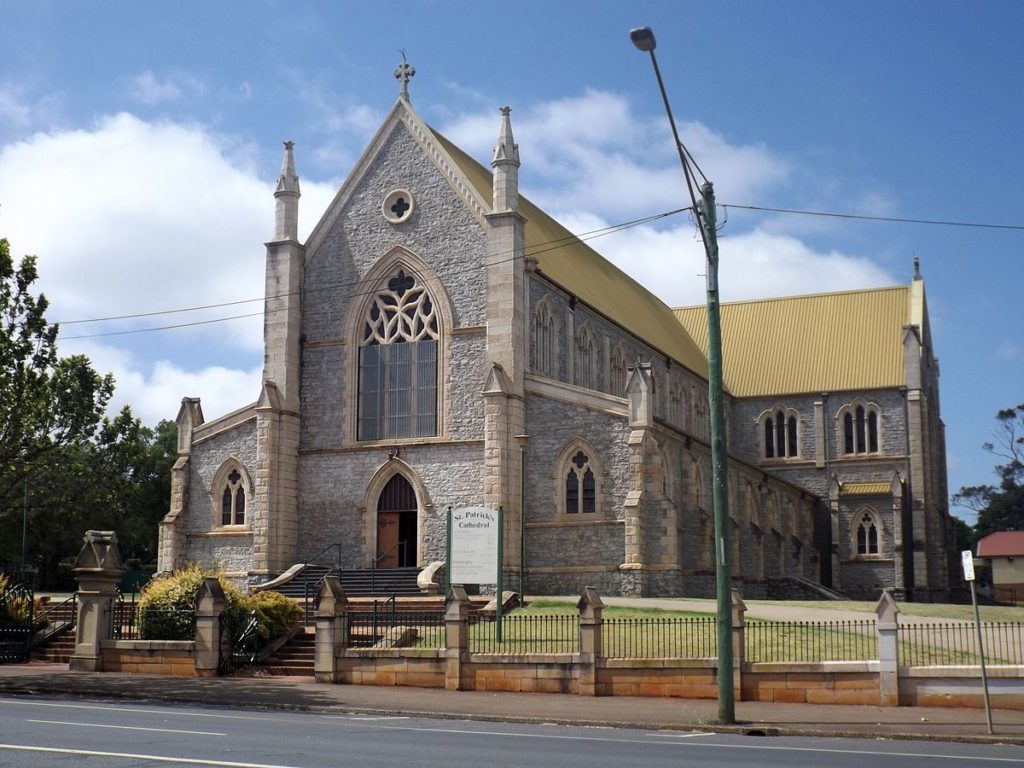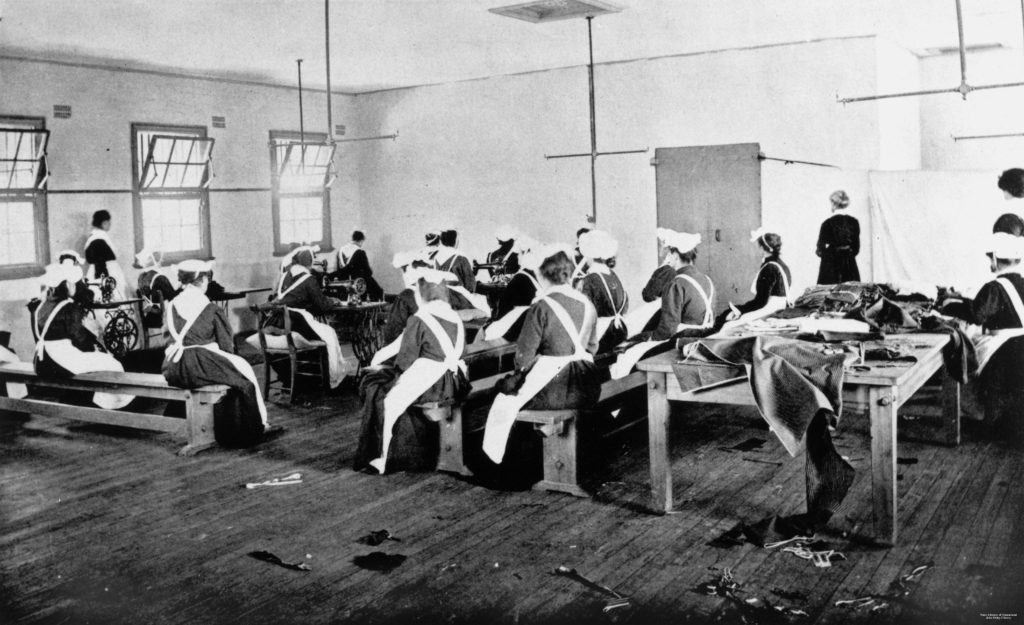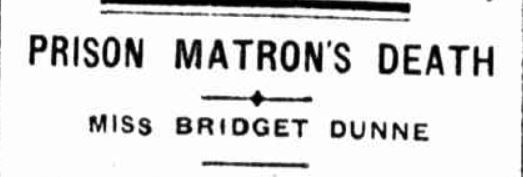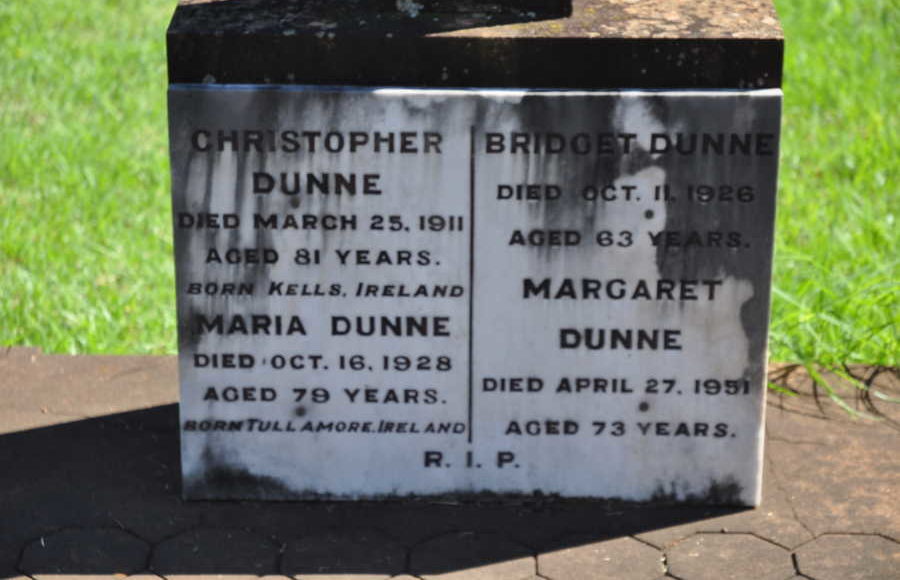Trailblazer- Bridget Dunne
- On : 18 July, 2018
- By : Boggo Road Gaol
- Category : Stories
- View : 2420
Trailblazer – Bridget Dunne
In the twentieth century it was common for occupations to be handed down from father to son, particularly when it relates to a position in a government department – this was seen to be a very successful step forward, indeed, a hand up. This week we are looking at an interesting case of a father to daughter occupational connection. Christopher and Bridget Dunne were both employees in the Prisons Department for their entire careers in Australia, both having served a portion of their career in the Brisbane Prison later known as Boggo Road Gaol.
In the twentieth century it was common for occupations to be handed down from father to son; particularly when it relates to a position in a government department as this was seen to be a very successful step forward; indeed, a hand up. This week we are looking at the interesting case of a father to daughter occupational connection. Christopher and Bridget Dunne were both employees in the Prisons Department for their entire careers in Australia. Both having served a portion of their career in the Brisbane Prisons later known as Boggo Road Gaol.
Indeed, it was very common for nepotism to take place in Government Departments, usually because those in the employ of the government could often afford to educate their children (particularly sons) in some of the finer schools in Queensland. Those students would then make the finer cadets and employees of the department. Young ladies also had the option of better schooling, but it was very uncommon. Women in society of the time were not generally among the working classes, particularly if she was interested in marriage and children (which was just the done thing).
Some young ladies, however, were not. I suppose dear Bridget would fall into that category. Most of the ladies in the Prisons department were the wives of prison officers. This is in fact the first father – daughter connection I have come across. Bridget was indeed a trailblazer.
Christopher Dunne
Clipper ship Golden CityChristopher Dunne was born in Kells, County Meath, Ireland in 1830. He was married first to Bridget Timmins in 1862. They had two older children and Bridget was expecting their third child on the voyage to Queensland on the Golden City. Their third baby was born somewhere between London and Brisbane and was listed at the customs inspection of the ship. Baby Bridget Dunne was the fifth member of the family.
Sadly, it seems that Bridget Dunne (nee Timmins) did not do well from the pregnancy and long voyage and died just a few weeks later. She was buried at the Paddington Cemeteries (where Suncorp Stadium now stands) and there is no formal registration of her death.
Christopher Dunne joined the prison service not long after the family arrived from London. His first appointment was at the Brisbane Gaol then located at Petrie Terrace; then at the police lockup at Ipswich.
It was in Ipswich that he would meet his future bride Maria Doorley. Maria too was a young Irish lass; she had emigrated with her father on the Saldanah in 1863 at just fourteen years old. They were married at St Andrew’s Catholic Church in Ipswich in 1872.
Indeed, the Catholic faith would be a strong influence in Christopher’s life. All his children were baptised into the church, both of his marriages were solemnised in the church, and even his last moments would be in faith.
Christopher and Maria went on to have four more children. The family resided at Ipswich at their home “Argan” on Margaret Street for the remainder of their days. Christopher would go on to work at the new HM Brisbane Prison in 1883 (Number One Division Boggo Road Gaol) for two years before returning home to Toowoomba and joining the staff at the Toowoomba Gaol.
Christopher remained at the Toowoomba prison as Senior Warder until his retirement in 1899. He died some twelve years later in 1911 and was buried at the Toowoomba Cemetery. His obituary in the Darling Downs Gazette summarised his extensive career but also his character:
He was the last surviving member of “The Dunne’s of Carstown”; Deceased was of a very retiring disposition but by his unostentatious manner he endeared himself to numerous friends. Numerous wreaths, telegrams and letters were sent from all over the state (fifty-three wreaths and thirty-one telegrams and letters).
His remains moved from St Patricks Roman Catholic Church to the Toowoomba Cemetery where he was laid to rest.
Bridget Dunne
Bridget began her career in the prison service working under her father at the Toowoomba Prison as wardress in the industrial school for girls in 1898. This was initially under a trial basis for six months; I suppose something like a traineeship. It obviously meshed well, as Bridget was officially made a wardress in the official announcements for the Prisons Department in 1899. Interestingly, just before her father retired!
Bridget went on in leaps and bounds from there, working under the mentorship of Sarah Ann Nixon, Wardress in the Women’s Prison at Toowoomba. Quickly rising through the ranks, she was soon temporary senior warder when Sarah Ann Nixon was made Matron in 1901.
During this time a great deal of change was happening in the prisons of South East Queensland. Indeed, a great shift was soon to be made, in the next twelve months three prisons would close and the Her Majesty’s Prison Brisbane (Female Division) would open.
The female division is the only remaining section of the Brisbane Prisons (later known as Boggo Road Gaol). This division would later be taken over as a men’s division and the women would be moved several times on the gaol reserve.
One of the prisons that eventually closed was the female prison at Toowoomba. Bridget Dunne became Warder and Sarah Ann Nixon became Senior Warder under Matron Sarah Browne.
Over the next five years, Bridget learned to manage the women under her charge. Towards the end of 1908, Matron Sarah Browne fell ill and subsequently retired. Sarah Ann Nixon was promoted to Matron and Bridget was promoted to Senior Warder, quite a step up from her position as wardress. As the years would pass she would rise in rank again, this time in March 1923 when Sarah Ann Nixon fell ill, she was made Temporary Matron. By September, Sarah Ann Nixon had retired, and Bridget was made Matron of the Female Division, Boggo Road Gaol.
Sadly, Bridget would only remain in the position for two and a half years. Having been ill for the previous twelve months, she was forced to take leave in July 1926 after almost thirty years of service. Bridget would never return to her position. She died on the 13th of October 1926 at just fifty-eight years old.
Bridget Dunne had never married, nor had she had any children. Her remains were sent by train to Toowoomba. She was buried with her father at the Toowoomba Cemetery.
Her obituary in the Queensland Times newspaper best describes her career and her character:
She always displayed a sympathetic and humane spirit to those who came under her charge. Often at personal inconvenience. Little acts of kindness were performed by her, particularly when they were once more entering on the battle of life.
These remarkable officers are just two of many that entered the big iron gates each day. This Sunday, you too can get locked up by one of our former officers! Come inside and find out some of the fascinating aspects of life behind bars. If you are on good behaviour you might even get early parole! You can book your tickets here
This article was contributed by Research Coordinator Sue Olsen as part of the ongoing research program for Boggo Road Gaol Pty Ltd. The aim of the program is to bring to light and share articles relating to Boggo Road for the purposes of review and study. Do you have a story to share or something you would like us to know about? You can contact the research team here


